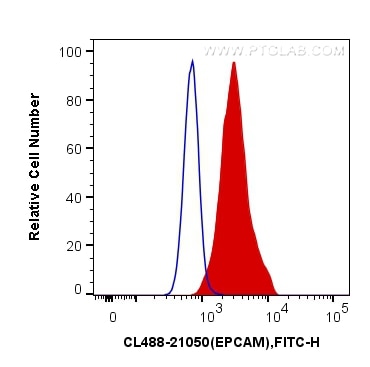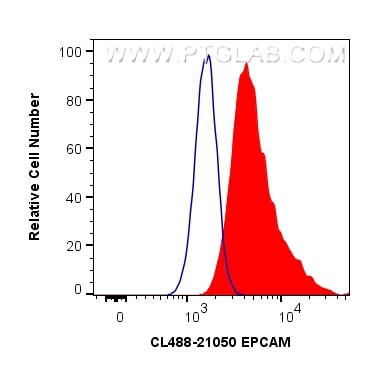- Phare
- Validé par KD/KO
Anticorps Polyclonal de lapin anti-EPCAM
EPCAM Polyclonal Antibody for FC
Hôte / Isotype
Lapin / IgG
Réactivité testée
Humain, souris
Applications
FC
Conjugaison
CoraLite® Plus 488 Fluorescent Dye
N° de cat : CL488-21050
Synonymes
Galerie de données de validation
Applications testées
| Résultats positifs en cytométrie | cellules MCF-7, cellules HT-29 |
Dilution recommandée
| Application | Dilution |
|---|---|
| Flow Cytometry (FC) | FC : 0.40 ug per 10^6 cells in a 100 µl suspension |
| It is recommended that this reagent should be titrated in each testing system to obtain optimal results. | |
| Sample-dependent, check data in validation data gallery | |
Informations sur le produit
CL488-21050 cible EPCAM dans les applications de FC et montre une réactivité avec des échantillons Humain, souris
| Réactivité | Humain, souris |
| Hôte / Isotype | Lapin / IgG |
| Clonalité | Polyclonal |
| Type | Anticorps |
| Immunogène | EPCAM Protéine recombinante Ag15393 |
| Nom complet | epithelial cell adhesion molecule |
| Masse moléculaire calculée | 314 aa, 35 kDa |
| Poids moléculaire observé | 35-40 kDa |
| Numéro d’acquisition GenBank | BC014785 |
| Symbole du gène | EPCAM |
| Identification du gène (NCBI) | 4072 |
| Conjugaison | CoraLite® Plus 488 Fluorescent Dye |
| Excitation/Emission maxima wavelengths | 493 nm / 522 nm |
| Forme | Liquide |
| Méthode de purification | Purification par affinité contre l'antigène |
| Tampon de stockage | PBS avec glycérol à 50 %, Proclin300 à 0,05 % et BSA à 0,5 %, pH 7,3. |
| Conditions de stockage | Stocker à -20 °C. Éviter toute exposition à la lumière. Stable pendant un an après l'expédition. L'aliquotage n'est pas nécessaire pour le stockage à -20oC Les 20ul contiennent 0,1% de BSA. |
Informations générales
Epithelial cell adhesion molecule (EpCAM, CD326) is a type I transmembrane glycoprotein that functions as a homophilic, epithelial-specific intercellular cell-adhesion molecule. In addition to cell adhesion, EpCAM is also involved in cellular signaling, cell migration, proliferation, and differentiation. EpCAM is highly expressed on most carcinomas and therefore of potential use as a diagnostic and prognostic marker for a variety of carcinomas, and has become a therapeutic target. EpCAM may occur in distinct forms due to glycosylation. (PMID: 20837599; 19249674; 21576002; 22647938; 12691820)
Protocole
| Product Specific Protocols | |
|---|---|
| FC protocol for CL Plus 488 EPCAM antibody CL488-21050 | Download protocol |
| Standard Protocols | |
|---|---|
| Click here to view our Standard Protocols |



